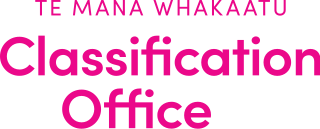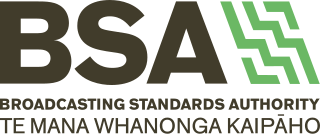Three, stylised as +HR=E, is a New Zealand nationwide television channel. Launched on 26 November 1989 as TV3, it was New Zealand's first privately owned television channel. The channel currently broadcasts nationally in digital free-to-air form via the state-owned Kordia on terrestrial and satellite. Vodafone also carries the channel for their cable subscribers in Wellington and Christchurch. It previously broadcast nationally on analogue television until that was switched off on 1 December 2013.

The Office of Film and Literature Classification, branded as the Classification Office, is an independent Crown entity established under Films, Videos, and Publications Classification Act 1993 responsible for censorship and classification of publications in New Zealand. A "publication" is defined broadly to be anything that shows an image, representation, sign, statement, or word. This includes films, video games, books, magazines, CDs, T-shirts, street signs, jigsaw puzzles, drink cans, and slogans on campervans. The Chief Censor, Caroline Flora, is the chair of the Office.
In Ireland, the state retains laws that allow for censorship, including specific laws covering films, advertisements, newspapers and magazines, as well as terrorism and pornography, among others. In the early years of the state, censorship was more widely enforced, particularly in areas that were perceived to be in contradiction of Catholic dogma, including abortion, sexuality and homosexuality. The church had banned many books and theories for centuries, listed in the Index Librorum Prohibitorum.

The Broadcasting Standards Authority |Te Mana Whanonga Kaipāho (BSA) is a New Zealand Crown entity created by the Broadcasting Act 1989 to develop and uphold standards of broadcasting for radio, free-to-air and pay television.
The Society For Truth And Light is a pressure group with an official mission of "address[ing] social ethics, media behaviour, and sex culture in Hong Kong" from a Christian Right point of view "to care the society and service people through research, monitoring, education and publishing."

The New Zealand Media Council is a non-governmental organisation which exists to uphold standards in the New Zealand media industry and promote freedom of speech in New Zealand. Founded in 1972 as the New Zealand Press Council, it is enabled to hear complaints against newspapers and other publications, particularly regarding allegations of bias and inaccuracy. It can order an offending publication to publish a summary of the Council's ruling, and will generally specify the prominence of the summary.
The Australian Commercial Television Industry Code of Practice is a self-regulatory code adopted by free-to-air broadcasters in the Australian media. Although developed by industry, the code has been registered with the Australian Communications and Media Authority (ACMA).
The mass media in Serbia refers to mass media outlets based in Serbia. Both state-owned and for-profit corporations operate television, magazines, and newspapers, which depend on advertising, subscription, and other sales-related revenues. The Constitution of Serbia guarantees freedom of speech.
Censorship in New Zealand has been present since around 1850 and is currently managed by the Classification Office under the Films, Videos, and Publications Classification Act 1993.

The Advertising Standards Authority (ASA) is the self-regulatory organisation of the advertising industry in the United Kingdom. The ASA is a non-statutory organisation and so cannot interpret or enforce legislation. However, its code of advertising practice broadly reflects legislation in many instances. The ASA is not funded by the British government, but by a levy on the advertising industry.
Michael Noel James Hosking IV is a New Zealand television and radio broadcaster who has worked for Radio New Zealand and TVNZ and from 2008 has been the weekday breakfast host on Newstalk ZB with "The Mike Hosking Breakfast". He is a supporter of the centre-right National party and is often openly critical of the Labour-led government. He has lived and worked as a broadcaster in Wellington, Christchurch and currently resides in Auckland.
The publishing of any "blasphemous libel" was a crime in New Zealand under Section 123 of the Crimes Act 1961 which allowed for imprisonment for up to one year. However, Section 123 protected all publications and opinions on any religious subject expressed in good faith and decent language against prosecution and specified that prosecution may proceed only with the leave of the attorney-general.

Human rights in New Zealand are addressed in the various documents which make up the constitution of the country. Specifically, the two main laws which protect human rights are the New Zealand Human Rights Act 1993 and the New Zealand Bill of Rights Act 1990. In addition, New Zealand has also ratified numerous international United Nations treaties. The 2009 Human Rights Report by the United States Department of State noted that the government generally respected the rights of individuals, but voiced concerns regarding the social status of the indigenous population.
New Zealand is committed to the Universal Declaration of Human Rights and has ratified the International Covenant on Civil and Political Rights, both of which contain a right to privacy. Privacy law in New Zealand is dealt with by statute and the common law. The Privacy Act 2020 addresses the collection, storage and handling of information. A general right to privacy has otherwise been created in the tort of privacy. Such a right was recognised in Hosking v Runting [2003] 3 NZLR 385, a case that dealt with publication of private facts. In the subsequent case C v Holland [2012] NZHC 2155 the Court recognised a right to privacy in the sense of seclusion or a right to be free from unwanted intrusion.
The Human Rights Review Tribunal is a statutorily established institution fundamental to the application, determination and up holding of human rights in New Zealand. The tribunal is established under the New Zealand Human Rights Act 1993. The Human Rights Review Tribunal is one of two key human rights bodies in New Zealand and provides the mechanism for adjudication and resolution of human rights issues. The jurisdiction of the tribunal extends to cover matters from domestic human rights law, principles given in the Privacy Act 1993 and the Health and Disability Commissioner Act 1994. Complaints may be bought by the Director of Human Rights or where it is deemed not appropriate to do so, a citizen may proceed with a claim at their own cost. The tribunal has the power to grant a wide range of remedies and in making a determination, is not required to give effect to technicalities but rather, the substantial merits of the case. The Human Rights Review tribunal also holds special status within the array of tribunals in New Zealands domestic legal system, with a far more significant legal jurisdiction than other inter partes tribunals. This special status reflects the fact that decisions of the tribunal can have substantial political and societal implications.
Ngatikaura Ngati was a New Zealand toddler of Tongan descent who died of child abuse in January 2006. After the conclusion of the trial of Ngati's killers, a judge ordered the release of the coroner's autopsy photographs of the child, for the purpose of encouraging the public to report other instances of abuse. TVNZ 1 broadcast the images, and they subsequently appeared on the Internet, sparking a debate about the balance between promoting awareness of child abuse, and maintaining dignity and respect for the deceased child.
The Office of the Privacy Commissioner administers the Privacy Act 2020. The Privacy Commissioner is entrusted to protect personal information of New Zealanders in accordance with the Privacy Act. Current Privacy Commissioner, Michael Webster, began his role in July 2022.
Chinese Voice is a Cantonese, Mandarin and English language radio network based in Auckland, New Zealand. It is a wholly owned subsidiary of Best News Entertainment, an Asian language television, print and radio company, and consists of three station set up between 2003 and 2010. It produces more than 80 hours of local content each week, including live talkback on news stories, migrant issues, political developments and dealing with New Zealand Government agencies. The stations also broadcast imported talk and music programmes from China and Hong Kong.

Radio Tarana is a New Zealand radio network, broadcasting in Auckland. It broadcasts a mixture of music, information, news, sports, culture, events coverage and lifestyle features. The station was the first commercial full-time New Zealand radio station targeting migrant communities. According to the 2014 TNS New Zealand radio survey, it remains the highest-rating ethnic broadcaster in the country.
TV advertisements by country refers to how television advertisements vary in different countries and regions.